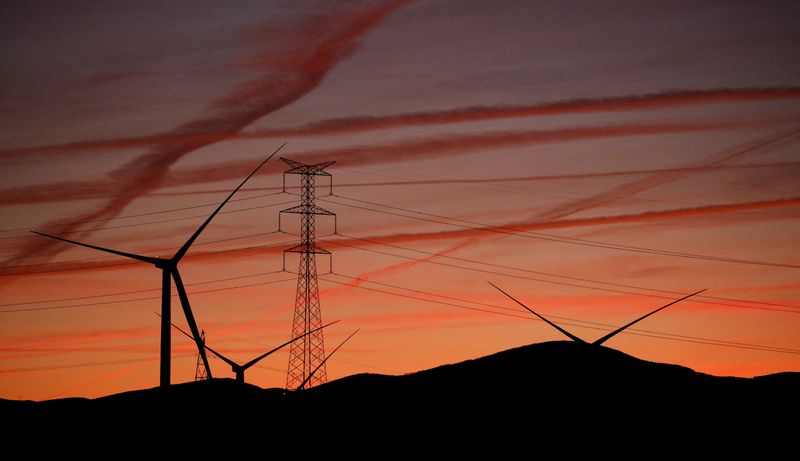By Vera Eckert and Kate Abnett
FRANKFURT/BRUSSELS (Reuters) - The European Union is preparing an emergency plan to separate power prices from the soaring cost of gas - as well as longer-term reforms aimed at ensuring electricity prices reflect cheaper renewable energy.
Energy ministers from EU countries will meet on Sept. 9 to discuss how to ease the burden of soaring energy prices on businesses and households as a matter or urgency.
European power costs have surged in the last year, driven by record gas prices as Russia curbed supply to Europe.
European governments have accused Moscow of using energy as blackmail, in retaliation for western support for Ukraine after Russia's invasion. Russian gas giant Gazprom (MCX:GAZP) says it is a reliable supplier and has blamed cuts in flows on technical issues.
Changing the 27-country EU's energy systems may be complex and lengthy, as the cross-border trading of energy commodities among the bloc's members has taken two decades to emerge and solidify. But policymakers are racing to find a short-term solution.
Here's why Europe is considering energy market reforms, and what they could entail.
WHY IS THE ELECTRICITY PRICE LINKED TO GAS?
In the EU energy system, the wholesale electricity price is set by the last power plant needed to meet overall demand.
Wind farms, nuclear, coal and gas plants and all other generators bid into the power market, with the cheapest sources coming in first, followed by pricier sources like gas. Gas plants often set the price in this system.
The idea is that because all generators sell their power at the same price, the cheaper renewables generators end up with a bigger profit margin - a stimulus that incentivises more investment in the renewable generation Europe needs to reach climate change goals.
But countries including Spain have said the system is unfair, as it results in cheap renewable energy being sold to consumers for the same price as costlier fossil fuel-based power.
Gas prices have soared as Russia has cut the volumes it sends to Europe. Gas prices are determined by global competition for the fuel, and European buyers are competing with firms in other countries to snap up non-Russian gas.
The effect has been to drive up the price of producing power from gas in Europe, resulting in higher overall power prices.
"The current market design offers Russia, for example, a virtual field of action for destructive market manipulation," Nina Scheer, parliamentary energy spokeswoman of the Social Democrats, the leading party in the Berlin coalition, wrote in the Handelsblatt business daily on Tuesday.
Other factors boosting power prices include problems with French nuclear plants and severe drought in Europe that hampered hydropower output and affected coal deliveries.
Germany's benchmark power contract for 2023 on Monday hit 1,050 euros a megawatt hour (MWh), 14 times the level a year ago.
HOW COULD THE EU CHANGE ENERGY PRICES?
EU Commission chief Ursula von der Leyen said on Monday that the EU needed to decouple the price of gas and power, without giving further details.
The Czech Republic, which holds the EU's rotating presidency, is rallying support for a cap on the price of gas used to generate electricity.
The idea of capping gas or power prices has long had support from Spain, Belgium and others, and now initially reluctant Austria and Germany. France is among the states in favour of action to separate the price of electricity from the price of gas.
One option, proposed by Italian Prime Minister Mario Draghi, would be for EU countries to agree a cap on the price of gas imported from Russia. Critics say that would risk Russia completely cutting off Europe's gas supply in retaliation.
Another option could be for governments to cap the gas price, and pay gas companies the difference between the capped price and the higher market price.
Countries, including Germany and the Netherlands, previously opposed that since it would effectively subsidise fossil fuel generation with public funds that they said would be better spent on the shift to cheaper clean energy.
Other options could include restricting financial speculators' participation in gas markets, or setting up a parallel market for gas-fuelled power, separate to the existing electricity market.
WHAT ARE THE POTENTIAL DOWNSIDES?
High gas prices provide a financial incentive for industries and households to reduce their gas consumption - a behavioural change governments are trying to encourage to ensure there is enough fuel to get through winter.
Capping the gas price would limit that incentive, and critics say it could even encourage more gas use when governments need to be rolling out policies to reduce consumption.

Some analysts have suggested targeted financial support for low-income households and businesses hit hardest by the soaring prices would be a better option than a hasty market overhaul.
Other questions remain about how governments could cap the cost of gas-fuelled power in a way that did not encourage gas plant owners to produce less power when countries urgently need it.